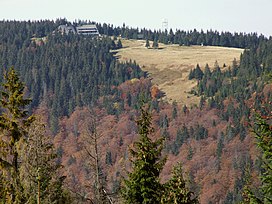| Revision as of 21:07, 11 March 2013 editDarwinek (talk | contribs)Autopatrolled, Administrators180,974 editsmNo edit summary← Previous edit | Revision as of 05:08, 21 March 2013 edit undoKLBot2 (talk | contribs)96,688 editsm Bot: Migrating 1 interwiki links, now provided by Wikidata on d:Q7853729Next edit → | ||
| Line 39: | Line 39: | ||
| ] | ] | ||
| ] | ] | ||
| ] | |||
Revision as of 05:08, 21 March 2013
| Turbacz | |
|---|---|
 A view of Turbacz, together with the shelter A view of Turbacz, together with the shelter | |
| Highest point | |
| Elevation | 1,310 m (4,300 ft) |
| Coordinates | 49°32′34″N 20°06′14″E / 49.54278°N 20.10389°E / 49.54278; 20.10389 |
| Geography | |
| Location | Poland |
| Parent range | Gorce Mountains |
Turbacz is the highest peak of the Gorce Mountains, a mountain range located in southern Lesser Poland. It lies in the middle of the range, and according to most sources, it is 1310 meters high. The peak itself is surrounded by dense pine forest, which makes it impossible for tourists to admire the view of the area. In the past, however, no trees were present there, and according to the 1832 sources, it was possible to see the city of Kraków with a telescope. On the top there is a stone obelisk with an iron cross. Turbacz belongs to the Crown of Polish Mountains.
Turbacz is very popular among tourists, with a junction of several trails located in front of a local PTTK shelter. The shelter itself, located at the height of 1283 meters, provides a magnificent view the Tatras and the Pieniny mountains. Turbacz shelter is a large stone building, with two wings. It was opened in 1958, and has 100 beds. Next to the shelter there is a PTTK Museum of Mountain Culture and Tourism, opened in 1980.
Every second Sunday of August a Celebration of Mountains takes place next to the so-called Papal Chapel, on the Wisielakowka clearing. It attracts a number of tourists, and in the same spot, a traditional service was led by Reverend Józef Tischner. On August 12, 2012, a monument dedicated to Polish soldiers was opened on the Wisielakówka clearing. Every summer, a mountain bike race takes place from Rabka Zdrój to Turbacz and back.
During World War II and in the second half of the 1940s, numerous anti-Nazi and anti-Soviet partisan units operated in the area of Turbacz. Most famous personality closely associated with the peak is Józef Kuraś, nom de guerre Ogień, a legendary Polish cursed soldier, who fought both Nazi and Soviet occupiers.
In the past, the mountain was known by local people as Kluczki. In 1790, Habsburg cartographers, working on the map of Galicia, made a mistake, placing the village of Niedzwiedz in the location of the peak, which resulted in naming confusion throughout the 19th century. The word Turbacz itself probably is of Wallachian origin, coming from the Romanian word turbă, which means "peat".